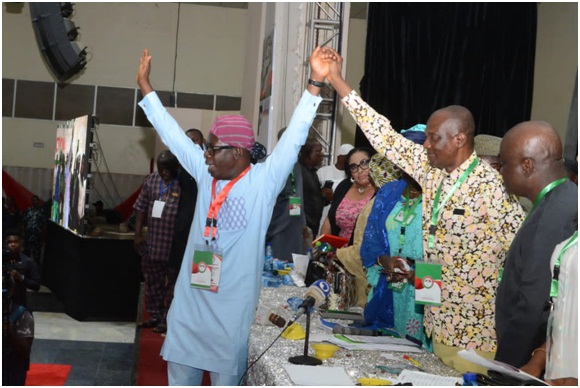How return of bride price makes traditional marriages invalid
By Kemi Olatunde
|
Marriage ceremonies are mostly conducted based on the blueprint that has been used over the years. Sometimes, there are variations that have found their way into the practice but the mainframe remains. Marriage ceremonies help to preserve the culture of the people.
The marriage ceremony serves as an honour and dignity to the couple and their families. In the eyes of the people, the couple is responsible. They are ready to take up responsibilities in marriage, this gives them social recognition and dignity in society.
It legitimizes children that are born into society. Marriage gives the children a sense of belonging to a clan and the right to inherit their parent’s property.
Marriage is not only between the couple but also between the two families. The ceremony unites the families of the couple. They share every moment of joy and get to know each other. In recent times, there are marriages across tribes and regions, so the ceremony brings tribes and ethnic groups together and promotes peace and unity between the two tribes, which inures to the nation at large.
Surprisingly, a recent wind of returning the bride price to the groom’s family has swept across the land; in the light of not selling the bride. Bride price is slowly but surely becoming alien and unwelcome in the 21st century, because the practice is misconstrued as such a dehumanizing practice to women, especially from a Western philosophical point of view. Parents perceive that their daughters are being maltreated by wicked husbands on the excuse that they have been paid for, like a “commodity”.
While many blame this derision on families that take advantage of the bride price to make outrageous demands, others believe that how a man treats his woman may not necessarily depend on whether or not he paid her bride price, but greatly on his personality. Saying men maltreat their wives because they paid their bride price is like saying the expensive diamond engagement rings also produce women-beaters in the West. Jacob served 14 years as a price to marry Rachel; a “Bride Service” that portrayed the value he placed on her – which is what the token called bride price is all about.
In this era, it appears many are not aware that the bride price serves to protect the marriage from dissolution. It is NOT degrading to women and does not reduce them to slaves; not in any way tantamount to making a man feel like a slave master who owns a slave he has paid for. In actual fact, bride price is an instrument to ratify a marriage. It is one of the highest honours confirming a bride’s value and womanhood; giving a husband the full rights to the sexual, economic, or procreative powers of his wife. It fosters a friendly relationship between the two families; providing a material pledge that the woman and her children will be well treated, and a level of compensation to her natal family for the loss of her company and labour.
It is most often a matter of social, cultural, symbolic and economic reciprocity, being part of a long series of exchanges between the families. A symbol of sincerity and good faith connected with a woman’s reputation and esteem in the community. A token that highlights a degree of commitment and chivalry in a man and shows he does not only value his bride, but also holds a high regard for her family. No amount of money can buy a wife; her value is inestimable in human terms. No man can pay for all the input of those who raised a good woman and all the benefits she brings; her love, care, help and companionship far outweigh any monetary value. A bride price is a humble demonstration of appreciation, honour and respect to the bride’s family for all the work they put into raising/training “this gift” from God, and returning it seems utterly disrespectful to the groom and his entire family. Where a man’s treasure is, his heart will be also; paying the bride price of a woman symbolises that a man has kept his treasure (money from his sweat) where his heart belongs.
Needful to say, in some cultures, a marriage is not reckoned to have ended until the return of bride price has been acknowledged, signifying divorce. When a woman intends to leave her husband, she is expected to return the goods initially paid to her family. So, before you decide to return the bride price on your daughter’s wedding day, consider that this is often done when a marriage is to be dissolved. Bride price is our heritage; a genuine and deep-rooted customary practice that makes marriages more meaningful, and prevents the despicable way of life where wives are extremely easy to find like stones, and equally easy to dispose of, like tissue paper.
It is a gift or payment. It may take the form of money, natural produce or some other forms of property; the payment is made to the parents or guardians of the bride-to-be on account of the marriage of the female person and it is paid in respect of a marriage which is intended or has taken place.
Whether bride price takes the form of a gift or payment depends on the customary law of each locality. Historically, bride price took the form of labour provided by the suitor for the parents of his wife-to-be. Such labour was rendered in addition to a small cash payment and drinks, but with the advent of modern cash economy, bride price took the predominant form of money payment. At the same time, payment in other forms of property became a rare occurrence.
There is no uniformity of the rules governing the quantum of bride price throughout Nigeria. It varies from one locality to another. Even within a state, the differences may be profound. For instance, in Anambra State, Onitsha town is known for low bride price which is about N40. On the other hand, Awka and environs are known for high bride price which may range in hundreds of Naira. Incidents of high-bride price in parts of Nigeria have been criticized for causing social ills, particularly in preventing young men who cannot afford the large sums of money demanded by parents of bride-to-be from getting married. Similarly, frustrated young women may be tempted to indulge in unmoral associations.
How much is actually paid in each case may depend on the outcome of negotiations between the two families. In other cases, the girl’s family merely asks the suitor to pay what he considers fit and proper for a wife.
In order to combat incidents of high bride price, action has been taken in several parts of Nigeria to limit, by legislation, what is payable.
The Limitation of Dowry Law 1956 regulates the quantum of bride price in the four Eastern States: Anambra, Imo, Cross River and Rivers States. Section 3(a) of the Law prescribes that N60 shall be the maximum bride price payable in respect of marriages where no incidental expenses are involved; but where incidental expenses are payable, the bride price shall not exceed N50 and the incidentals the sum of N10. The law defines ‘incidental expenses’ of marriage as “customary gifts or payments, other than dowry, made or incurred, on account of a marriage, before, at the time or after marriage.” What in fact constitutes incidental expenses varies from one part of the country to another. However, the distinction between bride price and incidental expenses is of some importance, even though both payments are made in respect of the marriage.
The right to the bride price is not only that of a father but also some members of his family. The interest of this group cannot be readily waived. On the whole, however, complete waiver of bride price is unusual. Some families merely ask the suitor for a token payment rather than grant outright waiver.
What we see and experience in recent times in relation to payment of the bride price is unbelievable. Today, the practice of bride price is aggressively negotiated, thereby reducing ladies to mere commodities for exchange. This has also made families see their daughters as a source of revenue generation.
In Yoruba customary law, bride price is known as idana. In patrilineal societies, it is the father who has the right to collect the bride price, and in his absence, the right is transferred to the eldest male in his immediate family. With this requirement, one wonders the role of the mother of the bride regarding bride price. In a situation where the parents of the bride are no longer cohabiting, does this mean that it is only the father that would be entitled to the gains from the bride price that is paid? This requirement of the father being the one to collect the bride price is faulty, as in most cases, mothers are shut out of the sharing of the bride price.
In Igbo culture, the significance and unavoidable payment of bride price, which is usually considerably high, has resulted in late marriages among men. This is because the bride price is high, and these men wait until they have enough money to cope with the burden of paying the bride price. One begins to question the essence of marriage. Save for companionship, the importance of marriage is to raise children who will take care of their parents when they grow old and are too weak to work. It is unfair to see parents working at an old age in order to cater for their children just because a high bride price was demanded, which eventually led to late marriage.
Someone once expressed her anger and frustration as she was of marriageable age, but remained unmarried. She had taken home six different suitors but her parents’ greed had caused her delay in getting married. Each time a suitor called, they insisted on a very high bride price, and when these suitors were unable to pay, the relationship would be brought to an inevitable end.
Some people have argued in favour of a high bride price, their argument being that the intending husband still does not pay as much as it took the family to bring up the lady he wants to have as his wife. A further argument is that if men were allowed to marry ladies cheaply, they would not respect them. It is this argument that must have informed my neighbour’s opinion when he said ”give your daughter through the backdoor and see how she will be treated’,’ but this is not true as there are instances where men did not pay a high bride price but still respect their wives. Some others have argued that the bride price brings about respect for women and helps people to see women as valuable members of the society.
Many Nigerians believe that eradicating the payment of bride price may not be a bad idea as it reduces women to objects of sale. Many young girls leave school and are forced into marriage in order to offset the debts owed by their fathers.
Bride price has lost its value, as it is now an avenue for parents to amass wealth for themselves at the expense of their daughters.
Also, many men see themselves as better than women because they paid a very high bride price, thus, women are unable and not allowed to make meaningful contributions in the home.
When women are victims of violence in the home and want to leave, they are forced to stay back because of fear of the husband asking their parents to return the bride price which he paid to them.
According to a 72-year-old retired teacher, Mrs Serifat Adeola, the bride price is not and can never be an emblem of love and affection for a woman, stating that if a man truly loves a woman, “why should he go through the hassle of having to pay bride price? Bride price reduces a woman to a property to be sold by her father to another man, with the aim of having children and doing house chores.
“If we have to continue with the tradition of bride price, moderation and reasonableness should be key. We must put in place some forms of control and regulation of the payment of bride price. Parents must not demand unreasonable payments from prospective husbands. Laws may be enacted for the regulation of the payment of bride price and stiff punishments placed on offenders. There must also be some forms of public enlightenment on the adverse effects of payment of high bride price. The use of traditional and religious leaders may be employed to propagate the need for a reduction in bride price.”
A retired health worker who craved anonymity called for the eradication of bride price, noting that it is irrelevant in today’s marriage.
“In our own days, few people married the proper way not because they didn’t want to do the right thing but due to so many factors. For instance, I didn’t do the traditional marriage because I grew up with an extended family member and when my husband came for my hand in marriage, they released me to him.
“I have over 20 years marriage experience and I will still choose my husband over and over again.
“Most of the marriages where value was placed on bride price have crumbled. Our culture at times is not helping matters. Some cultures force the would be husband to obtain a loan, just to marry a woman and in most cases, the woman is made to go through a lot, especially from the inlaws, due to the treatment from her family when she was to be married off. This isn’t right. Love is supposed to rule and not extort other people, after all they cannot marry her in their family.
“The Yoruba culture returns the bride price. It is commendable, but like I said earlier, building a home should not be based on the issue of bride price. So many things keep marriage of which either acceptance of bride price or its return is never among these things.”
“In essence, bride price should be kept for what it really is, an emblem of a union between two families and a gesture of appreciation, honesty and sincerity. It should not be seen as a means for parents to amass wealth,” she said.










